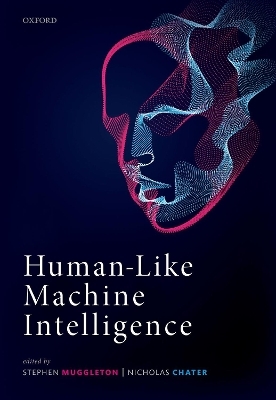
Human-Like Machine Intelligence
Oxford University Press (Verlag)
978-0-19-886253-6 (ISBN)
In recent years there has been increasing excitement concerning the potential of Artificial Intelligence to transform human society. This book addresses the leading edge of research in this area. The research described aims to address present incompatibilities of Human and Machine reasoning and learning approaches. According to the influential US funding agency DARPA (originator of the Internet and Self-Driving Cars) this new area represents the Third Wave of Artificial Intelligence (3AI, 2020s-2030s), and is being actively investigated in the US, Europe and China.
The chapters of this book have been authored by a mixture of UK and other international specialists. Some of the key questions addressed by the Human-Like Computing programme include how AI systems might 1) explain their decisions effectively, 2) interact with human beings in natural language, 3) learn from small numbers of examples and 4) learn with minimal supervision. Solving such fundamental problems involves new foundational research in both the Psychology of perception and interaction as well as the development of novel algorithmic approaches in Artificial Intelligence.
Stephen Muggleton is Professor of Machine Learning in the Department of Computing at Imperial College London. He is the Director of UK EPSRC NetworkPlus on Human-Like Computing He was the founder of the field of Inductive Logic Programming to which he has made contributions in theory, implementations and applications and has over 200 publications. He has been Executive Editor of the Machine Intelligence workshop series since 1992 and Editor-in-Chief of the series since 2000. In particular he acted as Programme Chair of the Machine Intelligence 20 and 21 workshop on Human-Like Computing (Cumberland Lodge, 23-25 October 2016; 30 th June-3rd July 2019). Nick Chater FBA, Professor of Behavioural Science, Warwick Business School Nick works on the cognitive and social foundations of rationality. He has written over 250 publications and co-written or edited more than a dozen books, has won four national awards for psychological research, and has served as Associate Editor for the journals Cognitive Science, Psychological Review, and Psychological Science. He was elected Fellow of the Cognitive Science Society in 2010, Fellow of the British Academy in 2012, and Fellow of the Association for Psychological Science in 2014. Nick co-founded Decision Technology, a consultancy applying psychology to business; and he is a member of the UK's Committee on Climate Change. His book The Mind is Flat (Penguin/Yale University Press), won the Association of American Publishers PROSE Award for Best Book in Clinical Psychology, 2018.
PART 1 Human-Like Machine Intelligence
1: Human-Compatible Artificial Intelligence
2: Alan Turing and Human-Like Intelligence
3: Spontaneous communicative conventions through virtual bargaining
4: Modelling virtual bargaining using logical representation change"
PART 2 Human-Like Social Cooperation
5: Mining Property-driven Graphical Explanations for Datacentric AI from Argumentation Frameworks
6: Explanation in AI systems
7: Human-Like Communication
8: Too many cooks: Coordinating multi-agent collaboration through inverse planning
9: Teaching and explanation: aligning priors between machines and humans
PART 3 Human-Like Perception and Language
10: Human-Like Computer Vision
11: Apperception
12: Human-Machine Perception of Complex Signal Data
13: The sharedworkspace framework for dialogue and other cooperative joint activities
14: Beyond robotic speech: mutual benefits to cognitive psychology and artificial intelligence from the joint study of multimodal communication
PART 4 Human-Like Representation and Learning
15: Human-Machine Scientific Discovery
16: Fast and slow learning in human-like intelligence
17: Interactive Learning with Mutual Explanations in Relational Domains
18: Endowing machines with the expert human ability to select representations: why and how
19: HumanDSMachine Collaboration for Democratizing Data Science
PART 5 Evaluating Human-Like Reasoning
20: Automated Commonsense Spatial Reasoning: Still a Huge Challenge
21: Sampling as the human approximation to probabilistic inference
22: What can the conjunction fallacy tell us about human reasoning?
23: Logic-Based Robotics
24: Predicting problem difficulty in chess
| Erscheinungsdatum | 24.07.2021 |
|---|---|
| Zusatzinfo | 92 line art, 18 combo, and 13 halftones |
| Verlagsort | Oxford |
| Sprache | englisch |
| Maße | 175 x 252 mm |
| Gewicht | 1208 g |
| Themenwelt | Geisteswissenschaften ► Psychologie |
| Informatik ► Theorie / Studium ► Künstliche Intelligenz / Robotik | |
| ISBN-10 | 0-19-886253-9 / 0198862539 |
| ISBN-13 | 978-0-19-886253-6 / 9780198862536 |
| Zustand | Neuware |
| Haben Sie eine Frage zum Produkt? |
aus dem Bereich


